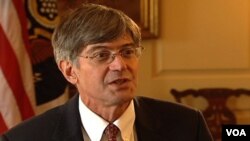Deputy Secretary of State James Steinberg, in remarks to the Eighth Annual International Institute for Strategic Studies Global Strategic Review Conference in Geneva on September 11, 2010, said global order is based on 2 strategic premises: The first is that no state can meet alone the challenges posed by dramatic political, economic, social, and technological changes in the last 2 decades; the second is that U. S. engagement and leadership are required to bring about the necessary international cooperation in meeting these new challenges.
"Our approach," Deputy Secretary Steinberg said, "is based on this recognition that there have been significant changes in the international landscape - the rise of new powers, the emergence of non-traditional threats, and increasing global interdependence -- we need to adapt our strategies to the time. At the same time, we believe in the enduring value of the basic principles that have served the United States and our partners so well during the Cold War: the need for leadership engagement, strong alliances, capable institutions, and an international order based on law and respect for universal rights."
Deputy Secretary Steinberg noted that this approach is based on 3 key elements: "First is the need to adapt and strengthen our long-standing core bilateral relationships. Second, we need to forge constructive ties with emerging centers of powers. Third, we need to build new structures, formal and informal, to facilitate regional and global cooperation."
Deputy Secretary Steinberg explained that partnership with Europe remains at the core of America's global strategy, and Japan remains the cornerstone of America's engagement in East Asia. "But our approach also embodies elements of change, and nowhere is that more apparent than in our efforts to build new cooperative relations with the emerging global and regional powers, beginning with India, Russia and China, but also key countries like Brazil, Indonesia and Turkey." He added: "We do not see their rise as an inherent threat to our interest, though we recognize the cooperation will not come automatically. For this reason, we have placed a high priority on strengthening our dialogue and our engagement with these key emerging powers."
"Ultimately," Deputy Secretary Steinberg concluded, "the decision to reinvigorate global cooperation is not ours alone, but leadership from America remains as necessary as ever."
Global order is based on 2 strategic premises.




